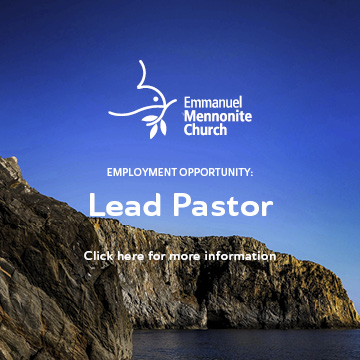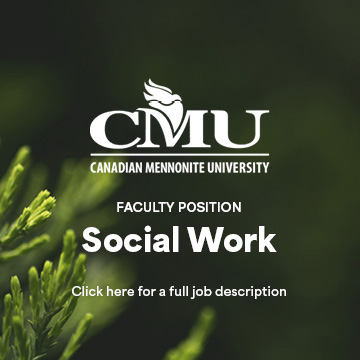At the end of March 2014, Canada’s final Truth and Reconciliation Commission event took place in Edmonton. While the commission is legislated reconciliation between Aboriginal Peoples and the Canadian government, many go freely to participate and stand in solidarity with those who have suffered injustices.
Several First Mennonite Church (Edmonton, Alta.) members and youth took the opportunity to hear first-hand accounts of what they have been learning in school and at church.
For a few weeks prior, the youth learned about Canada’s colonial history, the residential schools, and the effects the schools had on Aboriginal people.
Ethan Haluza-DeLay, a 15-year-old, grade 10 student, was one of six First Mennonite Church (FMC) youth who attended and sat in on a sharing circle. He says he learned more about what residential schools were really like, and he felt that it’s far worse than what he learned in school.
“We learned a bit about the residential schools in Socials class, but we didn’t learn any stories from people—what it was actually like. I didn’t know how bad it was. I heard stories, but I hadn’t heard it first-hand,” Ethan says.
Fifteen-year-old Darian Wiebe-Neufeld says the TRC proved to him even more how many injustices were committed. “I knew all the fundamentals [about residential schools], but every time I go to something like this, it just gets worse and worse in my mind,” he says.
Kessler Douglas, who is also 15 and in grade 10, learned that much of the trauma was swept under the rug. “I learned that there’s a lot of suffering from residential schools and that the government has been hiding it a lot. I think it’s good they’re making a step forward to come out with it and give support to people who have experienced residential schools,” he says.
“It’s good to learn about what’s done wrong in the past so we can better our future,” Douglas says.
Seventeen-year-old Alexandra Neufeldt is critical of the way aboriginal history is taught in school. “We don’t talk about it very much, and it’s not addressed very thoroughly in schools. It’s a really important issue, and you don’t really talk about it or learn about it very much. It’s a very censored subject. It’s important to go in and learn about what actually happened and the effects nowadays,” she says.
FMC’s youth weren’t the only ones who attended TRC events. For two months prior, Randy Haluza-DeLay led an adult Sunday school, to educate churchgoers.
Haluza-DeLay is a sociology professor at The King’s University College in Edmonton and member of First Mennonite. His two children attended TRC events, and he led an adult Sunday school class for two months prior to the national TRC event.
He had class participants read Shalom and the Community of Creation: An Indigenous Vision by Randy S. Woodley, an aboriginal theologian.
Other FMC members, including Rick Enns, a University of Calgary social work professor, and a Dene Mennonite named Len Franz also led some of the Sunday school sessions.
Haluza-DeLay thinks it’s important to include youth in events like this. “They live in Canada and are a part of this history that has ongoing implications. Mennonites have benefitted from the dispossession of the land from Aboriginal Peoples,” he says.
But it’s even more important to build community that spans racial divides and to maintain it, he says. “[People in the church are] always talking about the need to build relationships. How do you build relationships? That’s harder to do. This was an opportunity, a really good opportunity to listen to some of the really important things that have happened and the implications,” Haluza-DeLay says.
“The kids need to hear that, the adults need to hear that, and now we need to figure out what to do next. That’s a lot harder.”
At this point First Mennonite Church doesn’t have plans for further involvement, but the youth say they’re open to listening more and participating in more acts of solidarity.
“If an opportunity arises to show my support, I will. I’ll do what I can in my everyday [life] to lessen the racism,” Wiebe-Neufeld says.
--Posted May 8, 2014
For more on Mennonites and the Truth and Reconciliation Commission, see:
Anabaptist church leaders offer statement to residential school survivors
A modest proposal for truth, reconciliation
Poem: Truth and reconciliation
‘Four directional thinking’ on indigenous-settler relations
American Mennonites attended past TRC event
One thing lacking (web-exclusive sermon)
Who is blind? (web-exclusive sermon)




Add new comment
Canadian Mennonite invites comments and encourages constructive discussion about our content. Actual full names (first and last) are required. Comments are moderated and may be edited. They will not appear online until approved and will be posted during business hours. Some comments may be reproduced in print.